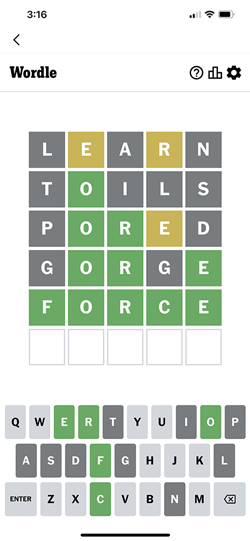Cheating at Wordle
Teaser: In which your correspondent confesses to a weak moment that also has some interesting implications, or at least that’s what he’s telling himself.
By Brad Berens
Bless me, Reader, for I have sinned.
La Profesora and I aren’t competitive when the stakes are real, but this mutual support does not apply to vicious games of Gin Rummy or to the daily Wordle puzzle from The New York Times.

Created with DALL-E
I resisted falling into the Wordle trap for years because I can—news flash!—get a little OCD about such things, which then sucks up time better spent on things like writing this column. What I didn’t realize was that, since NYT only releases one Wordle per day, I can’t lose too much time.
That also raises the stakes of the daily puzzle. (There’s a lesson about strategic scarcity in that.) In December, I fell. Nowadays, La Profesora and the kids and I share our daily Wordle scores via text. In a separate thread, three of my beer buddies and I also trade scores. This is serious.
And there begins my sadness.
Early Tuesday morning, La Profesora texted the group chat that she had solved that day’s Wordle in three moves. The gauntlet lay on the ground. My cheek stung.
I have a method for Wordle based, unsurprisingly, on research and strategy. The most statistically likely 10 letters in the English language are, in order, E,A,R,I,O,T,N,S,L,C. I can make two words out of those letters: TRACE and LIONS (“loins” also works, but who likes to keep on typing the word “loins”?).
Typically, I start with TRACE—since it contains E, A, and R—not really thinking about the puzzle until move three.
After two tries, I had T I _ _ E… and hit a wall. I texted the family thread: “I’m stumped after 2 tries and will return to this later.”
Time passed.
I knew that the word did not have R,A,C,L,O,N, or S. That left 16 letters… and I only had one move left to tie La Profesora!
We’re not built for this. The reason we have an obesity problem is that there are abundant supplies of junk food that appeal to our most primitive “need calories” instincts. The reason we have a misinformation crisis is that powerful algorithms optimize fake news stories that appeal to our worst prejudices and let us spread those fake news stories effortlessly.
When it comes to solving Wordle, I have two weaknesses. The first is that I tend not to look for repeated letters, so it will take me longer to find “funny” than “honey” because of the pesky double N in funny.
 The second weakness is my vocabulary, which—after an advanced degree in Renaissance literature and a debilitating lifelong addiction to reading for which there is no Bibliophiles Anonymous twelve-step program—is vast. That is a problem because Wordle tends to feature common words. This has resulted in painful memories, like the puzzle from March 30 (right):
The second weakness is my vocabulary, which—after an advanced degree in Renaissance literature and a debilitating lifelong addiction to reading for which there is no Bibliophiles Anonymous twelve-step program—is vast. That is a problem because Wordle tends to feature common words. This has resulted in painful memories, like the puzzle from March 30 (right):
This was before I had developed my TRACE and LIONS method—which would have yielded better results—but see how “pored” and “gorge” are both less common than the ultimate solution: force?
And yes, I screencap all my Wordle solutions. Remember that verging-on-OCD thing?
Back to Tuesday: at 11:20am, facing meetings that would take my mind far from Wordle, I phoned a friend (Google). I searched “five letter words that begin with t i and end with e.” A cluster of answers popped up. The correct one was obvious: tithe.
Feeling stupid and ashamed at the same time is lethal.
I did not claim my fake three move score with either the family thread or the beer buddy thread. I did not even screencap the solved puzzle (which forced me to reconstruct my moves while writing this).
In attempting to tie La Profesora, I had cheated myself.
Can I get an ego te absolvo?
Although this is mostly an (I hope) amusing confession, there are two implications.
First, my Wordle guilt is unusual.
I have no compunction and zero guilt about cheating at Wordscapes, a similar game that my friend Juliet (curse her) introduced me to a year or so ago. Wordscapes is an infinite-play (and therefore infinitely addictive, which is why I’m not even linking to it… Spare yourselves! Remember me! Tell my story!) free game that will suck up your brain as you decipher how many words you can make out of seven letters.
Each solved puzzle rewards you with points that you can use to get a clue when you’re stumped on a later puzzle (you can also buy points; I won’t). Since getting clues is a feature of the game, I have no issue with simply getting clues from another source (Google).
Wordle is different. Although other websites provide hints and cheats for Wordle, NYT does not. You’re on your own. Still worse, if you solve Wordle for days in a row, then each day you’ll see your “streak” get bigger, but if you skip a day or fail to solve the puzzle, it’s back to the start. Unlike Wordscapes, your streak doesn’t equate to points that you can use to get a hint. It’s an intrinsic metric, pride, with no extrinsic value.
I care a lot more about Wordle than I do about Wordscapes.
Second, I have to work not to cheat at Wordle; I have to spend precious decision-making energy choosing the journey and not skipping to the destination, which is hard.
We’re not built for this. The reason we have an obesity problem is that there are abundant supplies of junk food that appeal to our most primitive “need calories” instincts. The reason we have a misinformation crisis is that powerful algorithms optimize fake news stories that appeal to our worst prejudices and let us spread those fake news stories effortlessly.
As I’ve explored elsewhere, we now have to choose to make bland meals, write bad essays, take bad photographs, make boring presentations, and get lost while driving to learn how to cook, write, photograph, present, and navigate. This is hard because algorithms eagerly raise their virtual hands to do these things for us.
It’s hard to say, “no thank you,” but intrinsic metrics like pride can make it a little easier.
And that’s why I’d rather lose to La Profesora than use Google to help me solve Wordle.
Late-breaking news: I lost on today’s Wordle. Streak reset to zero. Failure shared with family and friends.
Sigh.
There’s always tomorrow.
__________

Brad Berens is the Center’s strategic advisor and a senior research fellow. He is principal at Big Digital Idea Consulting. You can learn more about Brad at www.bradberens.com, follow him on Post and/or LinkedIn, and subscribe to his weekly newsletter (only some of his columns are syndicated here).
See all columns from the Center.
April 24, 2024

